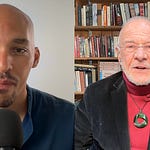Dear Listener,
I am thrilled to share with you the highlights from my recent conversation with Sherry Rais, CEO and Co-Founder of Enthea. Sherry has dedicated her career to helping startups, non-profit organizations, and small businesses operate according to their mission and values. She is currently focused on expanding access to psychedelic-assisted therapy to alleviate human suffering.
After spending 10 years consulting for the United Nations and World Bank, she started realizing the extent of global disparities in mental health care.
"In high-income countries like Canada and the US, 70% of people with psychosis receive treatment,” she notes, “However, if you go to low-income countries, that number plummets to 12%.”
Witnessing the limitations of traditional approaches to psychiatric care, Sherry was amazed by the high success rates of psychedelic-assisted therapy
Sherry's interest was initially sparked by studies on psilocybin, MDMA, LSD, and ketamine-assisted therapy, particularly those conducted in the United States. However, she also found inspiration from research in the UK, Australia, and Canada.
Now, she leads Enthea – the first and only third-party administrator of health plan benefits, working with employers who want to offer psychedelic treatments to their employees, starting with ketamine therapy, which is legal for the treatment of depression. This milestone paves the way for broader coverage through large insurance plans.
During our conversation, Sherry emphasized the importance of responsible engagement with psychedelic tools.
While adverse effects exist, rigorous clinical trials have shown that when administered in a clinical setting, the risks are minimal. Sherry acknowledged the need for ongoing research but highlighted the wealth of information available from phase three clinical trials conducted by organizations like MAPS.
I invite you to listen to the full conversation with Sherry Rais, where we delve deeper into the profound impact of psychedelic medicine and the mission of Enthea to expand access to these transformative therapies.
Thank you for being a part of our community, and I look forward to sharing more thought-provoking discussions at the intersection of science, spirit, and society.
Golden light,
Dr. Richard L. Miller
Links and Resources
Enthea - Sherry Rais' company providing psychedelic therapy
MAPS (Multidisciplinary Association for Psychedelic Studies) - Clinical trials of MDMA-assisted therapy:
"How to Change Your Mind" book by Michael Pollan
Show Notes
Sherry's Background and Path to Psychedelic Medicine (1:29)
Spent 10 years in poverty reduction consulting for the UN and World Bank
Saw mental health was missing piece in fully addressing poverty
Explored mental health solutions and current treatments were inadequate
Discovered psychedelic medicine and impressive clinical trial results (60-80% remission rates)
Impressive Psychedelic Trial Results (4:31)
Initially impressed by psilocybin, MDMA, LSD and ketamine therapy trials
Focused on treatment-resistant depression and PTSD results
The Risks of Psychedelics Should Not Be Overlooked (8:21)
Important to fully disclose side effects, not disguise as "side effects"
Ketamine can cause nausea, vomiting, elevated blood pressure, heart rate issues
Psychological discomfort and higher addiction risk in non-therapeutic settings
Psilocybin and MDMA risks: hallucinations, paranoia, flashbacks, nausea, vomiting, blood pressure/heart rate changes
Current Knowledge of Psychedelic Risks (11:32)
Clinical trials rigorously document risks and adverse effects
Risks minimal in clinical setting versus recreational use
Studies by MAPS, Johns Hopkins and others provide detailed risk reporting
More research always valuable but substantial data exists
Insurance Coverage of Psychedelic Therapy (13:15)
Hope large insurers will cover psychedelic therapy after FDA approval
Currently ketamine approved but not broadly covered
Enthea offers psychedelic therapy coverage through employer benefits
Enthea's Breakthrough in Psychedelic Coverage (16:49)
First and only company reimbursing psychedelic therapy
Offers benefit plans to employers who want to cover employee psychedelic therapy
Starting with ketamine therapy, expanding as more psychedelics approved
Importance of Preparation and Integration Therapy (21:04)
Psychedelic experience provides insights, therapy before and after critical
Ongoing integration therapy polishes insights into daily life
Hope for increased insurance coverage of preparation and integration
The Global Mental Health Crisis (24:31)
25%+ globally suffering from anxiety, depression
Much higher in conflict areas like South Sudan (50% PTSD)
Developing countries have little access to mental health treatment
A Call to Action (29:43)
Check in on ourselves and loved ones
Care for each other and show love
Break stigma around discussing mental health
Seeking Psychedelic Testimonials: The Good, the Bad, and the Ugly.
We are currently looking for first-hand accounts of adverse effects of psychedelics—from ‘bad trips,’ to unwanted physiological complications, to abusive practices by guides, therapists, and shamans.
The interviews from this series will go into a forthcoming book on the topic—perhaps the first book its kind.
Please contact me if you would like to be interviewed. You can also leave us a voice message to share your story. We will keep your information anonymous unless you tell us otherwise.
NOTE: The podcast is always freely available thanks to our paid subscribers. Please share this post to show your support for transparency. The following transcript distills the key points from this show into a condensed form. It is meant as a reference - listen to the full episode for an accurate rendition of the conversation.
Transcript
Dr. Richard Miller 0:04
Welcome to Mind Body Health and Politics. I'm your host, Dr. Richard Louis Miller. The mission of Mind Body Health and Politics is to enhance your physical and emotional well-being and encourage community. I believe that human beings are tribal animals and thrive when we live in community because of our collaborative and cooperative nature. However, we must also remain aware that a very small percentage of individuals are predators who pose a danger to us. We need to be conscious of their presence and take necessary measures to protect ourselves, as they have the potential to become dictators if left unchecked.
Today on Mind Body Health and Politics, I am pleased to have Sherry Race as our guest. Sherry is a pioneer in bringing psychedelic medicine into the realm of insurance. We will be discussing her work and other topics of interest. Welcome to Mind Body Health and Politics, Sherry.
Sherry Rais 1:16
Hi, Richard. Thanks for having me.
Dr. Richard Miller 1:17
You're welcome. Sherry, let's go back a little to get some background. What led you to the field of psychedelic medicine? How did you become involved?
Sherry Rais 1:29
So that's an interesting story. I started my career in poverty reduction, spending 10 years consulting for the UN and the World Bank. I was focused then, as I am now, on how to reduce human suffering. Back then, I was doing it through poverty reduction and worked on programs at the national level in over 30 countries. My goal was to design and implement programs that would reduce poverty.
What I observed from all of that work was that poverty couldn't be fully addressed without considering mental health. This became evident through our outcome reports and impact assessments. While some people were able to escape poverty through our initiatives, I was always mindful of those who weren't. Even after controlling for factors like access to basic healthcare, education, and infrastructure, it became clear that mental health was the missing piece.
This realization led me to explore how we could address mental health in resource-constrained environments. For instance, I worked in countries like Afghanistan, Yemen, South Africa, and Nigeria. I delved into finding mental health solutions and was shocked to discover that even in the West, most of the ways we treat mental health are inadequate.
Dr. Richard Miller 3:18
Were okay. Fortunately.
Sherry Rais 3:22
So, as I saw, what we currently have to treat mental health, I was surprised that nothing we have is really effective. And I was a little disillusioned, but I kept looking and stumbled upon what was happening in the psychedelic space, and was really blown away. Richard and I won't talk too much more on this. But essentially, I saw that in the clinical trials with psychedelics, psychedelic-assisted therapy, anywhere from 60 to 80% of people were achieving full remission from their condition, which is one to four sessions of psychedelic therapy, and that's unheard of with anything else we have to treat mental health. So, that ultimately led me to leave a career I'd spent 10 years building and find a way to provide people with access.
Dr. Richard Miller 4:19
And whether a certain psychedelic that you're investigating is showing high rates of success.
Sherry Rais 4:31
I was initially blown away by the results from psilocybin, MDMA, LSD, and ketamine-assisted therapy.
Dr. Richard Miller 4:56
Were you primarily interested in the studies being conducted in the United States? Or was it due to your extensive travels? Were there other countries conducting psychedelic research that also piqued your interest?














